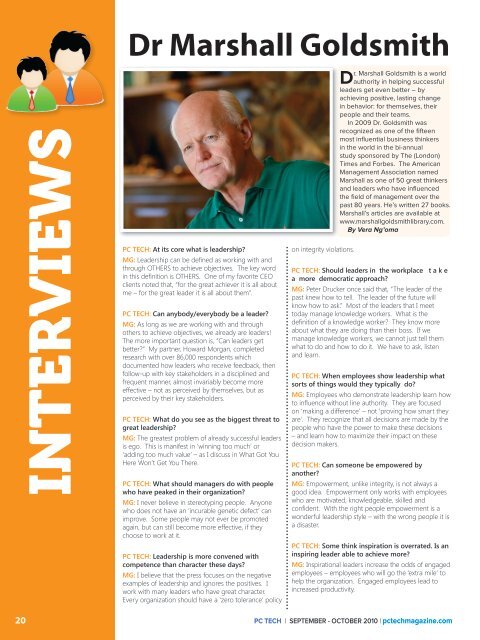Issue Seven - Conversations on Technology, Business and Society
Issue Seven - Conversations on Technology, Business and Society
Issue Seven - Conversations on Technology, Business and Society
You also want an ePaper? Increase the reach of your titles
YUMPU automatically turns print PDFs into web optimized ePapers that Google loves.
INTERVIEWS<br />
Dr Marshall Goldsmith<br />
Dr. Marshall Goldsmith is a world<br />
authority in helping successful<br />
leaders get even better – by<br />
achieving positive, lasting change<br />
in behavior: for themselves, their<br />
people <strong>and</strong> their teams.<br />
In 2009 Dr. Goldsmith was<br />
recognized as <strong>on</strong>e of the fifteen<br />
most influential business thinkers<br />
in the world in the bi-annual<br />
study sp<strong>on</strong>sored by The (L<strong>on</strong>d<strong>on</strong>)<br />
Times <strong>and</strong> Forbes. The American<br />
Management Associati<strong>on</strong> named<br />
Marshall as <strong>on</strong>e of 50 great thinkers<br />
<strong>and</strong> leaders who have influenced<br />
the field of management over the<br />
past 80 years. He’s written 27 books.<br />
Marshall’s articles are available at<br />
www.marshallgoldsmithlibrary.com.<br />
By Vera Ng’oma<br />
PC TECH: At its core what is leadership?<br />
MG: Leadership can be defined as working with <strong>and</strong><br />
through OTHERS to achieve objectives. The key word<br />
in this definiti<strong>on</strong> is OTHERS. One of my favorite CEO<br />
clients noted that, “for the great achiever it is all about<br />
me – for the great leader it is all about them”.<br />
PC TECH: Can anybody/everybody be a leader?<br />
MG: As l<strong>on</strong>g as we are working with <strong>and</strong> through<br />
others to achieve objectives, we already are leaders!<br />
The more important questi<strong>on</strong> is, “Can leaders get<br />
better?” My partner, Howard Morgan, completed<br />
research with over 86,000 resp<strong>on</strong>dents which<br />
documented how leaders who receive feedback, then<br />
follow-up with key stakeholders in a disciplined <strong>and</strong><br />
frequent manner, almost invariably become more<br />
effective – not as perceived by themselves, but as<br />
perceived by their key stakeholders.<br />
PC TECH: What do you see as the biggest threat to<br />
great leadership?<br />
MG: The greatest problem of already successful leaders<br />
is ego. This is manifest in ‘winning too much’ or<br />
‘adding too much value’ – as I discuss in What Got You<br />
Here W<strong>on</strong>’t Get You There.<br />
PC TECH: What should managers do with people<br />
who have peaked in their organizati<strong>on</strong>?<br />
MG: I never believe in stereotyping people. Any<strong>on</strong>e<br />
who does not have an ‘incurable genetic defect’ can<br />
improve. Some people may not ever be promoted<br />
again, but can still become more effective, if they<br />
choose to work at it.<br />
PC TECH: Leadership is more c<strong>on</strong>vened with<br />
competence than character these days?<br />
MG: I believe that the press focuses <strong>on</strong> the negative<br />
examples of leadership <strong>and</strong> ignores the positives. I<br />
work with many leaders who have great character.<br />
Every organizati<strong>on</strong> should have a ‘zero tolerance’ policy<br />
<strong>on</strong> integrity violati<strong>on</strong>s.<br />
PC TECH: Should leaders in the workplace t a k e<br />
a more democratic approach?<br />
MG: Peter Drucker <strong>on</strong>ce said that, “The leader of the<br />
past knew how to tell. The leader of the future will<br />
know how to ask.” Most of the leaders that I meet<br />
today manage knowledge workers. What is the<br />
definiti<strong>on</strong> of a knowledge worker? They know more<br />
about what they are doing than their boss. If we<br />
manage knowledge workers, we cannot just tell them<br />
what to do <strong>and</strong> how to do it. We have to ask, listen<br />
<strong>and</strong> learn.<br />
PC TECH: When employees show leadership what<br />
sorts of things would they typically do?<br />
MG: Employees who dem<strong>on</strong>strate leadership learn how<br />
to influence without line authority. They are focused<br />
<strong>on</strong> ‘making a difference’ – not ‘proving how smart they<br />
are’. They recognize that all decisi<strong>on</strong>s are made by the<br />
people who have the power to make these decisi<strong>on</strong>s<br />
– <strong>and</strong> learn how to maximize their impact <strong>on</strong> these<br />
decisi<strong>on</strong> makers.<br />
PC TECH: Can some<strong>on</strong>e be empowered by<br />
another?<br />
MG: Empowerment, unlike integrity, is not always a<br />
good idea. Empowerment <strong>on</strong>ly works with employees<br />
who are motivated, knowledgeable, skilled <strong>and</strong><br />
c<strong>on</strong>fident. With the right people empowerment is a<br />
w<strong>on</strong>derful leadership style – with the wr<strong>on</strong>g people it is<br />
a disaster.<br />
PC TECH: Some think inspirati<strong>on</strong> is overrated. Is an<br />
inspiring leader able to achieve more?<br />
MG: Inspirati<strong>on</strong>al leaders increase the odds of engaged<br />
employees – employees who will go the ‘extra mile’ to<br />
help the organizati<strong>on</strong>. Engaged employees lead to<br />
increased productivity.<br />
20 PC TECH | SEPTEMBER - OCTOBER 2010 | pctechmagazine.com


